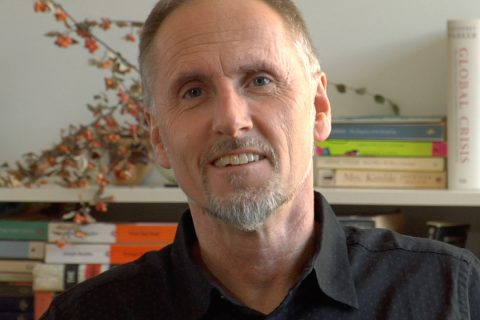Five years ago, John Belshaw decided to rewrite history. More specifically, he aimed to write a textbook for his Canadian history course and make it free and open for anyone to use. The reward for his labours? He would save his students more than $400.
It was a gamble. While disruption is affecting everything from Yellow Cabs to hotel rooms to smartphones–think Uber, Airbnb, a shuttered Blockbuster–with open textbooks, there remained lingering questions around quality, and very practical questions around who would do the work. Belshaw himself was unsure what kind of uptake his textbook would have.
“I think most of us are cautious about things that are new, and the introduction of technology into the classroom has been a long slog,” Belshaw said. “But I believed that if we provided a good framework, and if people could adapt it, then we’d wind up with textbooks that served learning in the classroom rather than publishers’ bottom lines.”
In 30 years of teaching, Belshaw had never been inspired to write a textbook. But he was motivated by the new generation of students, one that grew up buying Beyoncé’s latest song for a $1 and streaming the rest of the album for free, and was ready to question why they had to pay hundreds of dollars for textbooks each semester. It led to what he calls a mea culpa moment.
“I didn’t think the price of the textbooks I was assigning had inflated that much, but when I looked again, the pair of textbooks that I thought cost under $100 dollars was now over $300,” Belshaw said.
So in 2013, Belshaw began working with media and curriculum teams at TRU and BCcampus to produce his first text: Canadian History: Pre-confederation. It launched in January 2016, and is used both in on-campus courses and online courses at TRU. Since then, enrolment in the online HIST 1121 has jumped 71 percent, growing from 166 students to 284 year-over-year.
The text has been picked up by at least 11 post-secondary institutions in BC that Belshaw is aware of, and is also being used at no fewer than nine universities and colleges in Saskatchewan, Manitoba, Ontario and Newfoundland.
 “What’s good to know is that it can be used without modifying it right away, but tailoring it to one’s own pedagogy and place is always an option,” Belshaw said. “And for me, the real benchmark of acceptance has been York University’s history department. They have the largest history department in the country. The fact that they’ve embraced it is a real seal of approval.”
“What’s good to know is that it can be used without modifying it right away, but tailoring it to one’s own pedagogy and place is always an option,” Belshaw said. “And for me, the real benchmark of acceptance has been York University’s history department. They have the largest history department in the country. The fact that they’ve embraced it is a real seal of approval.”
There are over 230 open textbooks currently available on the BCcampus website and Belshaw now has two on the list; he collaborated with 37 other Canadian historians with different areas of expertise (including TRU’s Tina Block and Tracy Penny Light) to produce Canadian History: Post-confederation.
And on a weekend last November, a group of history experts convened by eCampus Ontario conducted a two-day textbook sprint to produce a prototype companion resource, Open History Seminar.
Tom Peace, an assistant professor of history at Huron University College in Ontario, participated in the sprint. He runs a website called ActiveHistory.ca and was first introduced to open textbooks when Belshaw approached him about publishing a series of essays on the site about the process of producing the material. Peace soon adopted the pre-confederation text into his own course and became excited about the potential that open resources have to change classroom practice.
“In the traditional model, the professor has to modify their pedagogical goals around the resource. This model is much more flexible, and really uses the digital environment to leverage that flexibility,” said Peace.
Specifically, he cited an annotation plug-in called Hypothes.is.
“This allows students to annotate their own material without going to an external resource. In class, we can pull up those annotations as a foundation for discussion,” Peace said. Hypothes.is has been included in the Open History seminar prototype, and Peace hoped to soon be able to use it in the classroom.
For Belshaw, the success of open texts signals a new, more collaborative approach in higher ed, where experts work together to create resources and initiatives build on each other. TRU is involved in two initiatives, including Zed Cred, which are university programs composed of courses with zero textbook costs, and the Open Educational Universitas (OERu), a consortium of institutions worldwide working toward a textbook-free, minimal-cost university degree.
Challenges remain. A lot of content needed to create open resources is still behind paywalls, which makes it difficult to create free texts and ancillary readers. But the culture has shifted, and the conversation has changed from if to how.
“When we have a conversation (at TRU) about producing new courses or revising courses, one of the questions we ask is what we can do to reduce or eliminate the costs of textbooks,” Belshaw said. “We will ask faculty, ‘What stands between you and open textbooks?’ That’s what we’re asking now, and we wouldn’t have asked that five years ago.”

